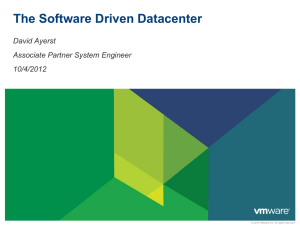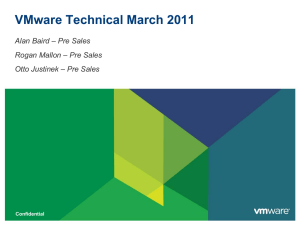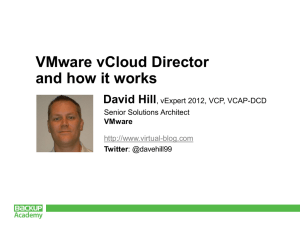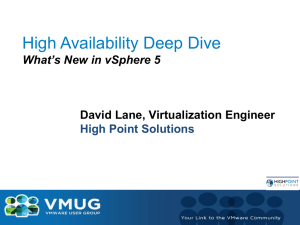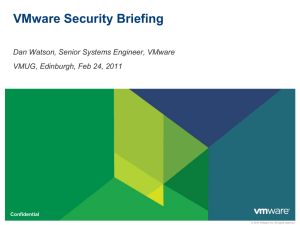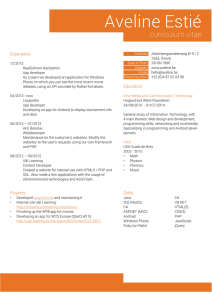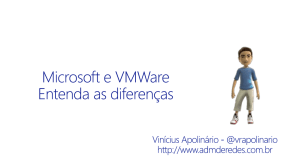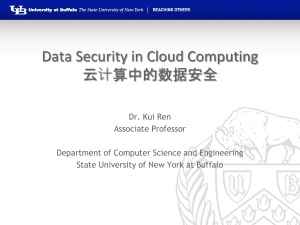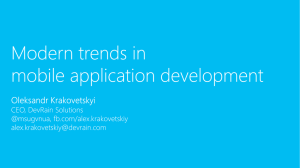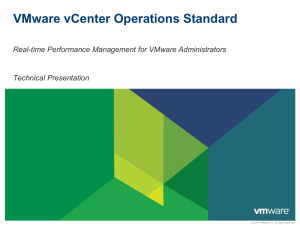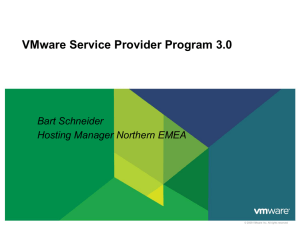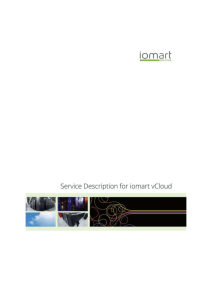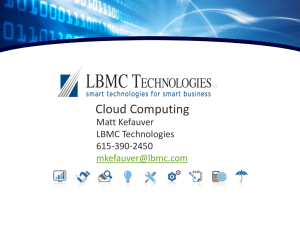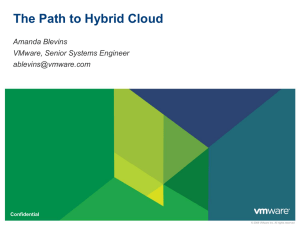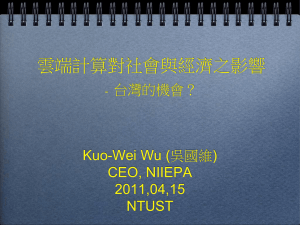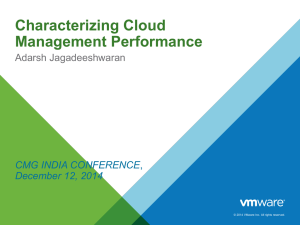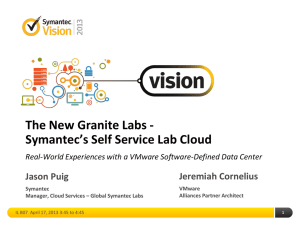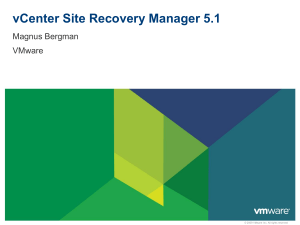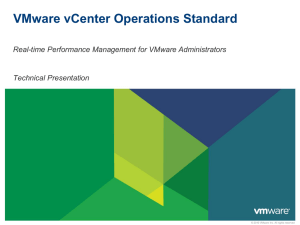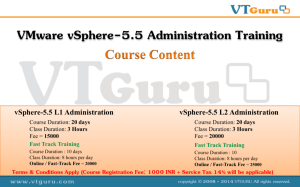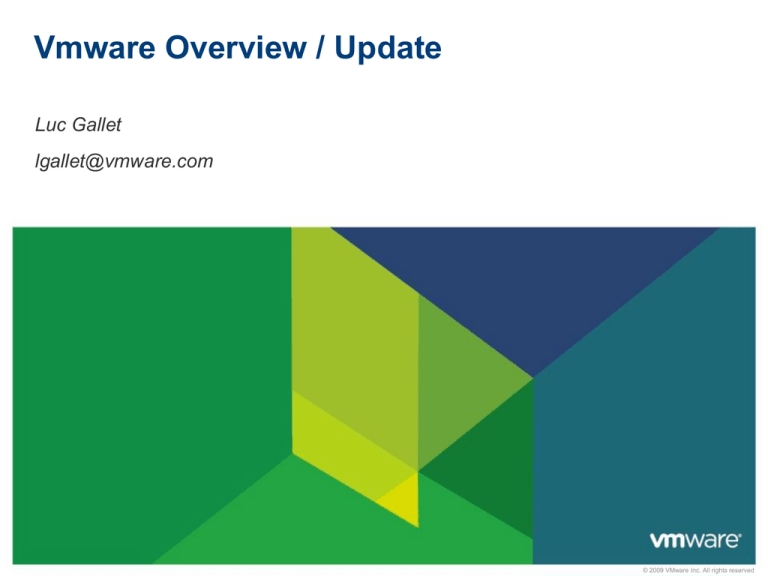
Vmware Overview / Update
Luc Gallet
lgallet@vmware.com
© 2009 VMware Inc. All rights reserved
Virtualization & Cloud Management: VMware Approach
End-User Computing Management
End User Computing
• Provision & deploy desktops rapidly
• Manage workstation images simply
• Deliver virtualized applications to desktop
IT Business
Management
Application Management
• Encapsulate applications into containers with vApps
Cloud Applications
• Assure application portability & performance
• Establish service contracts with infrastructure
• Govern cloud
provisioning
processes
• Track cloud
software license
usage
• Standardize
cloud partitions
Infrastructure & Operations Management
Public/Private/Hybrid Cloud
Virtualized Infrastructure
• VMware Cloud Director
• vSphere
3
• Create a zero-touch, compliant infrastructure
• Build automation into platform
• Deliver self-service through policy-driven control
VMware Management Solutions
Once upon a time…
… before virtualization
• 1:1 Ratio of Server/OS/Application
• Server Sprawl
• Low utilization
• Some Assembly Required
Provisioning time
• Complicated and cumbersome DR
• $4000/server/year
Power, cooling, real estate, networking
(NIC/HBA), service contracts…
5
Types of Virtualization
Round 1: The Client Hypervisor
Virtual Machines
App
App
App
App
App
OS
OS
OS
OS
OS
HyperVisor
HOST OS
6
Types of Virtualization
Round 2: The Server Hypervisor
Isolation
Partitioning
Hardware
Independence
Encapsulation
Virtual Machines
App
App
App
App
App
OS
OS
OS
OS
OS
App
App
App
App
App
OS
OS
OS
OS
OS
HyperVisor
System
Apps
=
= files in VMFS
Data
Batch
DR
Job
Test
App
OS
App
OS
App
OS
% Utilization
VMware Infrastructure
Physical
Server
7
Copyright © 2006 VMware, Inc. All rights reserved.
Types of Virtualization
Round 3: Virtual
Infrastructure
• Dynamic Computing
Vmotion
HyperVisor
X
HyperVisor
• Greater Availability
HA (High Availability)
• Quick imaging & provisioning
• Centralized resource
management
8
Round 4: the Virtual Data Center OS
virtual data center
9
Round 4: the Virtual Data Center OS
The Application is the
Focus
• Dynamic Compute resources:
RAM/processors
• Dynamic Network resources:
virtual nics/switches
X
virtual data center
X
10
X
• Dynamic disc resources –
sizing/allocation
• Fault tolerance
• Power Management
• Security
Round 4: the Virtual Data Center OS
Dynamic Computing
Vmotion – stateful (live)
migration of VM’s
virtual data center
DRS – automated migration
(load balancing)
+ intelligent auto-placement of
new VM’s
VM
Storage Vmotion – stateful
migration of vm’s storage - i/o,
maintenance, new storage
11
Round 4: the Virtual Data Center OS
Virtual Switching
Previously virtual switches
have been isolated to the host
virtual data center
Distributed switch creates a
virtual switch to span across
the environment
13
Round 4: the Virtual Data Center OS
Fault Tolerance
HA still available for lower tier
apps
virtual data center
X
Identify VM’s you want for fault
tolerance and start the service
A shadow VM is created and
takes over if host failure
occurs
14
Disaster Recovery
X
virtual data center
15
virtual data center
Storage
Replication
The Virtualization Journey – IT Production
COST EFFICIENCY
Stage
Sponsorship
IT Production
Virtualize Assets
Owned by IT and
Test & Dev Servers
Business Value
Key Capabilities
Pooling=
Abstraction+
Confidence
Shared Resources
Stages of Adoption and Maturity
17
The Virtualization Journey – IT Production
COST EFFICIENCY
QUALITY OF SERVICE
IT Production
Business Production
Virtualize Business
Applications,
Databases, and
Deploy More
Management Product
and Desktop
Virtualization
Control=
Service Definition +
Service Assurance
Stages of Adoption and Maturity
18
The Virtualization Journey – IT as a Service
COST EFFICIENCY
QUALITY OF SERVICE
IT Production
Business Production
BUSINESS AGILITY
>50% Virtualized with
Virtualization 1st
Policy Enforced,
Management
Automation
IT as a Service (ITaaS)
Zero-Touch
Infrastructure =
Policy-Driven Prov.+
Stages of Adoption and Maturity
19
Self-Service+
Chargeback
Private clouds, the best place to run tier 1 app’s
Consolidation
Decrease infrastructure cost for Server HW
Save space and energy in the datacenter
Archive consolidation ratios of 5:1 to 10:1
Scale physical infrastructure on demand
Availability
Minimize planned downtime
Reduce recovery timer for server failure down
to zero
Build cross site disaster recovery solutions
Increase overall availability
Use redundant infrastructure immediately
20
Private clouds, the best place to run tier 1 app’s
Scale infrastructure as needed
Manageability
Gain flexibility through workload mobility
Move Apps during hardware maintenance
Reduce management cost per app
Quality of Service
Ensure appropriate resource assignment
Continuously monitor SLAs
React proactive and fast to issues
Dynamic scale resource as application needs
grow
21
Technical Overview Technologies enabling
Automation
Self Service
Efficient Security
Efficient Management
Hybrid Clouds
...
22
vCloud Director – Architecture
VMware vCloud Director
Organization: Marketing
Users & Policies
Organization VDCs
Organization: Finance
Catalogs
Users & Policies
Organization VDCs
(Gold)
(Silver)
(Bronze)
Provider Virtual Datacenters
VMware vCenter Server
Resource Pools
Datastores
VMware vSphere
Secure Private Cloud
23
Port Groups
Catalogs
vCloud Director Portals
System Administrator View
System Portal
Organization Portal
Organization Administrator View
24
End User/Consumer View
Integrated vShield features simplify security and compliance
vShield for vCloud Director is a virtual
appliance providing essential perimeter
network and security services
firewall
including:
vShield
• Port-level stateful firewall
• Network Address Translation
• DHCP services
Enables fast, secure and automated
provisioning of multitenant Org
VDCs in private clouds
• Simpler, easer to operate
• One Edge per Org, deployed anywhere
• Built-in network isolation
• Integrated and manageable by REST APIs for script
and 3rd party automation
25
• Improved visibility, control and compliance
• Application aware NetFlow visibility
DHCP Services
vShield
Security from Edge to Endpoint
vShield Edge
vShield App
vShield Endpoint
Edge
Security Zone
Endpoint = VM
Application protection from
network-based threats
Offload anti-virus processing
Secure the edge of
the virtual datacenter
DMZ
Application 1
Application 2
vShield Manager
Endpoint = VM
Centralized Management
26
Virtualization is the Foundation for Cloud
20 MILLION VMs
Someone turns on
1 VM EVERY SIX SECONDS
If they were physical machines they
would stretch
2x the length of
Great Wall of
China
That’s faster than the rate of babies born in the U.S.
5.5 vMOTIONS PER SECOND
>68,000
VMware-CERTIFIED
At any given time, more VMs are in motion than
planes, which take off about once per second
globally.
27
PROFESSIONALS
IN 146 COUNTRIES
running on
VMware vSphere
Cloud Requires a New Approach
Traditional IT Management
Services and
assets tied
together in
complex, brittle,
vertical stacks
that are hard
to change and
manage
Business agility
suffers
28
Cloud Management
Service
components are
abstracted and
sourced from
dynamic
resource pools
with horizontal
layers loosely
bound into
services
IT able to keep up with
speed of the business
Traditional
Tools?
29
Example: Problems with Traditional Monitoring Tools
What does this really mean?
Why is it happening?
What should you do?
vSphere
vCenter
Server
Cloud
requires
Server, Storage,
Network
Monitoring
new
approach
OS, DB, App
Monitoring
to management.
a
Traditional monitoring tools alone can’t handle it.
30
Example: Problems with Static Thresholds and Alerts
Low thresholds cause alert storms
High thresholds miss alerts
?
31
Solving the Monitoring Problem with Analytics
Calculate
supermetrics from
thousands of data
points
Health
Risk
Efficiency
vCenter Server and external data sources
32
Solving the Alerts Problem with Dynamic Thresholds
GRAY BAR
Upper and Lower band
of Dynamic Threshold “Normal”
BLUE LINE
Metric’s Current
Value
RED BAR
Breached Dynamic
Threshold – “Abnormal”
33
Learns your dynamic ranges of “Normal” without templates
Learns patterns of behavior and identifies Abnormalities
Dynamic thresholds eliminate “false alerts”
vSphere Health Models further optimize analytics engine
34
Early Warning
VMware’s Approach and Differentiation
vCenter Operations Management Suite
1
35
2
3
Patented Analytics
Integrated Approach
Designed for Cloud
Self-Learning
Performance Data
Health Model
Dynamic Thresholds
Capacity Consumption
Open and extensible
Smart Alerts
Configuration Changes
Evolutionary Approach
vSphere
vCenter Server
Server, Storage,
Network Monitoring
OS, DB, App
Monitoring
Introducing vCenter Operations Management Suite 5.0
Key Capabilities
• New Operations Management
Dashboard
• Completely integrated capacity
management capabilities
• Application-dependency mapping
with vCenter Infrastructure
Navigator
• In-guest change events correlated
with performance and health
• Cost-based Capacity Optimization
with vCenter Chargeback Manager
36
Visibility into Immediate and Potential Future Problems
Operations
• Immediate
problems
• What is
happening
right now?
• What do I
need to pay
attention to?
Short and Long Term Capacity
• Forward
Looking
• Are there
areas that I
should be
concerned
about from a
capacity
perspective?
• Have I
deployed my
VI in the
most efficient
manner?
37
Health
Operations: Major Badge – Health
Efficiency
One Source of Truth Across the Enterprise
Risk
“How is our world doing?”
Health Score - Objective measure of performance
based on underlying level of abnormal behavior
High Health is good (100-0)
Identifies current problems in the systems
Issues that need to be resolved immediately to avoid
problems
Analytics based, calculated from 3 minor badges
(Workload, Anomalies, Faults)
For any resource or grouping:
A single Server, Device, Resource
Entire Tier or Silo
Entire Application or Service
-> Provides quick view of many objects at once
Entire Datacenter
-> Shows Health of all parent and child objects
Any Arbitrary Group of Resources
38
Heatmap
-> Go back in time (6 hours) and see the
“weather” of the Virtual Infrastructure
Smart Alerts – Before problems happen….
Health
Efficiency
Risk
Overview
Proactive alerts that provide early
Early warning
Smart Alert
warning on building issues
Identify upcoming health,
performance and capacity issues
Automatic root cause analysis of
offending metrics across all layers
Root cause and
potential impact
Benefits
Advance notification of abnormal
behavior help avoid incidents
Immediately focus on the root cause
rather than symptoms or false alerts
39
Capacity Planning – Risk
Health
Efficiency
Are there future risks to my systems
and virtual Infrastructure?
Identifies potential problems that could
eventually hurt the performance
Risk score over the last 7 days
Low risk is good (0-100)
40
Minor badges
Risk
Capacity Planning: Forecast - “What-If” Analysis
Capacity state
today
VM count
capacity
New capacity
shortfall if I add
10 new VMs
Actual VMs
deployed
Current capacity
cross-over point
41
Health
Efficiency
Risk
Capacity Planning: Major Badge – Efficiency
Health
Efficiency
Risk
Are there optimization opportunities in
my systems?
• Save $$$ by better utilizing resources
How to run a leaner datacenter
High Efficiency is good (100-0)
Graph Depicts VMs by Percent
• Optimal – Optimally Provisioned VMs
• Waste – Over Provisioned VMs
• Stress – Under Provisioned VMs
Efficiency Score calculated from Minor
Badges
• Reclaimable Waste
• Density
Three Resources Considered
• CPU
• Memory
• Disk Space
42
Health
Sub-Badges - Optimization Opportunities
Efficiency
Risk
Reclaimable Waste: lists excessive
resource allocation
• Identifies VMs with too many
CPUs/vRAM and hosts with too few VMs
Density: computes the ideal
consolidation ratio
• Computes optimal VMs per host to
maximize resource utilization without
sacrificing performance
43
VMware vCenter Operations Editions
vCenter Operations Enterprise
+ Full Configuration & Compliance
Management
vCenter Operations Advanced
vCenter Operations Standard
+ Capacity
Planning
+ Other VMware & 3rd Party Integrations
(View, management, servers, storage)
Performance
Real-time
Capacity
Configuration
Change
vSphere
VMware Cloud / vCenter
44
Non-VMware (incl. physical) environments
Enterprise hybrid cloud computing
Apps
Apps
•
Common platform
•
Common management
•
Common security
Private Cloud
VMware =
vCloud
Service Provider
EnterpriseSecurity
Hybrid Cloud
Cloud Infrastructure
Cloud Infrastructure
Management
Cloud Computing Moves from a
Technology Discussion to a Business Decision
45
vCloud Connector
vSphere
Public vCloud
vSphere Client
vCloud
Copy VMs/vApps/templates
from vSphere to
private/public vCloud
vSphere
See private/public
vCloud resources
inside vSphere
Client
46
-
Marketing vApp
-
QA template
vApps
CustomerSurvey vApp
Marketing vApp
vCloud
Catalog
-
CustomerSurvey vApp
-
Marketing
MarketingvApp
vApp
-
QA template
Perform basic operation on
vCloud resources such as
power ops & console
access
VMware offers a robust set of product and solutions
Enterprise Hybrid Cloud
Private Cloud
Public Cloud
Optimized Management
vCenter Operations
Portability
Service Delivery
vCloud Director
Security and Compliance
Cross-Cloud Standards
vCloud Powered
vCloud API
Open Virtualization Format
Broad array of
VMware-compatible clouds
for any business need
vShield Security Family
vCenter Configuration Manager
Cross-Cloud Management
vCloud Connector
Resource Management
vSphere
vCenter Management Family
47
Thank You
View 4.5: Delta Training – Revision 1.0
Luc Gallet - lgallet@vmware.com
48

